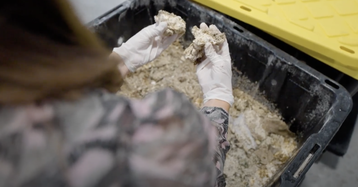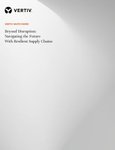Meta is testing the idea of using mushrooms to turn building waste into a useful product, at its rapidly-expanding site in Gallatin, Tennessee.
Since 2022. the company which owns Facebook has been working with specialist zero-waste firm Mycocycle to test the use of mushrooms that can eat drywall debris and trash, turning it into a useful raw material for new building work. Meta says it is using its buying power to expand the project to larger tests, which could lead to new circular-economy building materials.
DCD has contacted the two companies for more details than what is shared in Meta's published video.
Construction produces a huge amount of building waste, including material removed from demolished and altered buildings - each year in the US, some 660 million tons goes to landfill and incinerators.
Drywall, known as plasterboard in the UK, consists of panels of gypsum (calcium sulfate dihydrate) bound with paper and is a major part of this trash, and there is currently no easy way to recycle it. Meta currently disposes of tons of drywall debris every year.
When dumped in a landfill, drywall can decompose and react with other materials on the site, creating a strong smell and releasing hydrogen sulfide and ammonia, creating a health risk.
In 2022, Meta began a test with specialist firm Mycocycle, which uses mushrooms to eat drywall debris, with the aim of producing a useful byproduct that can be turned into other building products. Construction firm DPR is also involved in the project.
As mushrooms grow on the drywall material, their mycelium roots grow through the material, and break it down, "reducing it to simpler forms for their nutrition," said Daniel Reyes, Mycocycle’s head scientist, in the Meta video. “We’re looking at the final product of our pilot project using mycelium to convert gypsum drywall into a new mycelium composite."
The eventual product could be used in other building applications such as insulation or acoustic panels, he said.
Meta says it is now working with large building manufacturers to test the approach further, potentially using Meta’s buying power to stimulate the production of circular market building materials.
Mycelium produced by mushrooms has been proposed as a replacement for building materials before, for instance in a study sponsored by Microsoft and produced by the Carbon Leadership Forum (CLF) at the University of Washington. That study also suggested that earth, hemp, and algae could produce sustainable building materials.
Mycocycle says that the mushroom-based product can be made to be strong, fire-resistant, and waterproof, potentially replacing petroleum-based plastic materials in buildings.
The Microsoft-funded University of Washington study even went so far as to suggest that material based on mycelium tubes could even be made strong enough to replace some structural steel elements.
“Initiatives like the Meta/Mycocycle project are critical to the construction industry,” said Mycocycle CEO Joanne Rodriguez.
Jennifer Carland, sustainability manager of DPR, agrees: “This initiative is so critical because drywall waste is a huge problem."
Mycocycle has also trained mushrooms to help dispose of other building waste, including asphalt roofing shingles.




